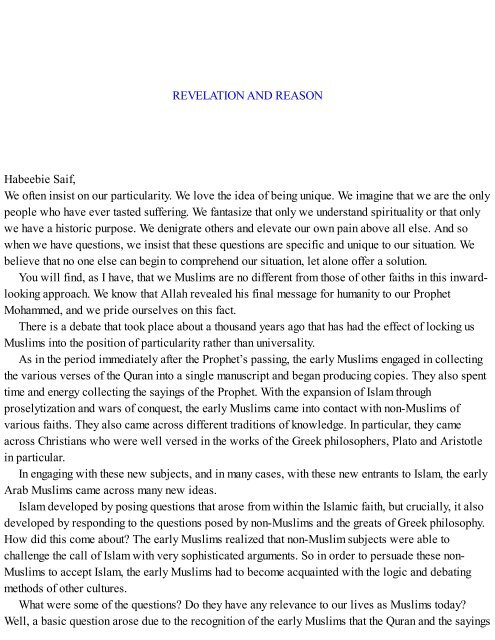1250119847
Create successful ePaper yourself
Turn your PDF publications into a flip-book with our unique Google optimized e-Paper software.
REVELATION AND REASON<br />
Habeebie Saif,<br />
We often insist on our particularity. We love the idea of being unique. We imagine that we are the only<br />
people who have ever tasted suffering. We fantasize that only we understand spirituality or that only<br />
we have a historic purpose. We denigrate others and elevate our own pain above all else. And so<br />
when we have questions, we insist that these questions are specific and unique to our situation. We<br />
believe that no one else can begin to comprehend our situation, let alone offer a solution.<br />
You will find, as I have, that we Muslims are no different from those of other faiths in this inwardlooking<br />
approach. We know that Allah revealed his final message for humanity to our Prophet<br />
Mohammed, and we pride ourselves on this fact.<br />
There is a debate that took place about a thousand years ago that has had the effect of locking us<br />
Muslims into the position of particularity rather than universality.<br />
As in the period immediately after the Prophet’s passing, the early Muslims engaged in collecting<br />
the various verses of the Quran into a single manuscript and began producing copies. They also spent<br />
time and energy collecting the sayings of the Prophet. With the expansion of Islam through<br />
proselytization and wars of conquest, the early Muslims came into contact with non-Muslims of<br />
various faiths. They also came across different traditions of knowledge. In particular, they came<br />
across Christians who were well versed in the works of the Greek philosophers, Plato and Aristotle<br />
in particular.<br />
In engaging with these new subjects, and in many cases, with these new entrants to Islam, the early<br />
Arab Muslims came across many new ideas.<br />
Islam developed by posing questions that arose from within the Islamic faith, but crucially, it also<br />
developed by responding to the questions posed by non-Muslims and the greats of Greek philosophy.<br />
How did this come about? The early Muslims realized that non-Muslim subjects were able to<br />
challenge the call of Islam with very sophisticated arguments. So in order to persuade these non-<br />
Muslims to accept Islam, the early Muslims had to become acquainted with the logic and debating<br />
methods of other cultures.<br />
What were some of the questions? Do they have any relevance to our lives as Muslims today?<br />
Well, a basic question arose due to the recognition of the early Muslims that the Quran and the sayings
















